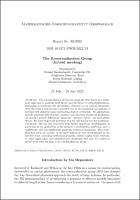Abstract
The renormalization group was originally introduced as a multiscale approach to quantum field theory and the theory of critical phenomena, explaining in particular the universality observed e.g. in critical exponents. Over the years it has become a powerful tool in the mathematical analysis of systems with infinitely many interacting degrees of freedom. Its applications include quantum field theories, classical and quantum statistical mechanics, (stochastic) partial differential equations, operator theory, and probability theory. For some important problems, it is the only known tool for mathematical proofs. The last few years have seen further important developments, in particular in the application of the method to probabilistic questions, and to equilibrium and non-equilibrium quantum statistical mechanics.
This workshop has given an account of the most important new developments in the last five years, including methodical progress, current applications, relations to other approaches, and identified new challenges that may be tackled in future work with the help of the renormalization group.

